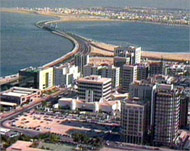Gulf economies gain post-Saddam
Gulf Arab states have enjoyed continued economic growth since the fall of Iraq’s Saddam Hussein, but the situation in Iraq plays an important role for the region’s future

The budget of OPEC kingpin Saudi Arabia posted a $12 billion surplus last year, the largest since 1980, against a projected deficit of 10.4 billion dollars. It is expected to be in the black again in 2004.
Kuwait, which was invaded and occupied by Saddam’s forces for seven months in 1990, looks certain to end the current fiscal year 2003-2004 with a surplus of five billion dollars, the largest since 1980 after projecting a deficit.
Other Gulf oil-producing nations, the United Arab Emirates (UAE), Qatar and Oman, have also made spectacular gains in the first year following the US-led invasion of Iraq.
Most of these countries, which receive three quarters of their revenues from oil, calculated crude at a conservative budget price of less than 20 dollars a barrel, while the actual price this fiscal year has been well over 25 dollars.
Saudi and Kuwaiti stock markets, the first and second largest Arab bourses, have hit all-time highs, ending 2003 up 70% and 101%, respectively.
 |
|
Risk factors were increased in the |
Economic effect of war
During Saddam’s 24-year rule the Arabian Peninsula witnessed three major wars, sharply increasing risk factors, and his ouster removed a major cause of uncertainty in the Gulf region.
Bishr Bakheet, head of Bakheet Financial Advisors in Riyadh, perceived a change in Washington’s language to assure the region that no more leaders would be toppled and no other countries invaded.
“The question was who would be next after Iraq. This has changed and nobody is next. This has spread a feeling of optimism,” he said.
The Gulf region stands to benefit even more in the future, but developments in Iraq could still cast a dark shadow and spread instability once again.
“Will Iraq be stable or not is the question,” leading Kuwaiti economist Jassim al-Saadun, head of Al-Shall Economic Consultants, said. “Iraq is a recipe for prosperity and a project for disaster as well.”
Many centres of tension remain in the region, contributing to uncertainty.
 |
|
Manama, Bahrain is the banking |
External pressures
“There are the domestic developments in Saudi Arabia which will affect other states. There are strong pressures within Iran and other states. This state of instability negatively affects the region,” Saadun told AFP.
Iraq is set to develop into the largest single economy in the region with proven oil reserves of 112 billion barrels, which are likely to increase to 350 billion barrels, Saadun said.
“The whole region will greatly benefit from Iraq. Kuwait stands the best chance because of its geographic location and its efficient infrastructure,” he said.
Kuwaiti companies have already won contracts in Iraq worth several billion dollars and are optimistic more contracts will come through.
“With a huge economic power next to you, the region will prosper provided Iraq gains stability … But attacks against the occupation forces are only increasing fears,” Bakheet said.
The Gulf states have earned around $50 billion more in oil revenues because of the war on Iraq, but they were made to forgive about 70% of some $100 billion of debt and war compensation owed by Iraq, said Saadun.
“Last year witnessed a mixture of negative and positive developments. But the future is promising. It however depends on Iraq’s stability,” noted Saadun.